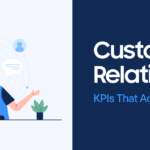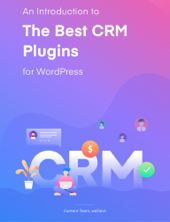Customer relationship management is an essential part of any successful business today. It eases your way of analyzing customer interactions and valuable data through the customer lifecycle to improve various business strategies and approaches.
But how could you do all these without properly tracking customer and market data from your end? Implementing CRM reporting can be helpful in this aspect. We’ll explain to you how to manage CRM reporting meticulously in this article.
You’ll also learn about the best CRM tools and practices for CRM reporting. Get started!
What Is CRM Reporting and Its Benefits?

CRM reporting is the process of analyzing data collected through customer relationship management. It extracts relevant information from the CRM database and compiles it in a meaningful way so the authority can take actionable decisions.
CRM reports can help you play with metrics and dimensions. You can represent the report findings with visuals like charts, graphs, and tables to make the data more understandable. Below is a list of some major benefits of CRM reporting.
a. Gain Insights into Customer Behavior and Preferences
CRM reporting helps you gain valuable insights into customer behavior, needs, and preferences. You can do this by studying customers’ attitudes to your products and how they react to your product qualities.
b. Identify Areas for Improvement
By analyzing data on sales performance and customer interaction, you can pinpoint the weaknesses that create barriers to customer contentment. Accordingly, you can optimize operations to enhance efficiency and customer satisfaction.
c. Segment Customer Better for Effective Marketing
Once you have detailed customer information, you can segment them well based on demographics, buying behavior, or preferences. This can result in more targeted marketing efforts, resonating with the right audience.
d. Identify Trends and Forecast Future
Thorough studies on customer behavior, sales patterns, customer queries, market dynamics, and historical data can guide you in identifying market trends and forecasting the future. Learn how to identify market trends.
e. Improve Team Collaboration
CRM reporting ensures the entire organization has access to the same information. This promotes transparency and enables better coordination, which can keep your organization ahead of many competitors.
Major Types of CRM Reporting Most Businesses Use

After exploring different organizations, we find a total of eight types of CRM reporting. According to the structure of your organization, you can select a suitable type from them. We’ll introduce you to them in this section.
1. Activity CRM Report
Operational CRM reports provide insights into everyday operations, tracking sales orders, marketing campaigns, money spent, customer service requests, etc. This helps businesses evaluate and improve operational efficiency.
2. Pipeline CRM Report
Pipeline CRM reports visually represent the various stages of the sales process. They include information about the number of deals in each stage, conversion rates, pending opportunities, and current revenue in the pipeline.
3. Customer Report
The new lead source report showcases the sources from which new leads are generated. It helps businesses identify which lead sources are most effective in driving new businesses and positively impacting marketing campaigns.
4. Forecasted Sales Report
This report compares expected sales with actual sales so businesses can analyze sales trends, identifying gaps between projected and achieved results. Accordingly, they can make informed decisions about resource allocation and goal setting.

5. Campaign Performance Report
It tracks the success of any marketing campaign using metrics like leads generated, conversion rates, and revenue generated from the campaign. You can assess the ROI of your marketing efforts and optimize the future approaches.
6. Customer Funnel Report
Funnel reports let you visualize the customer journey from the initial contact to conversion. It showcases the number of leads generated at each stage and the conversion rates between the sales funnel stages.
7. Sales and Profitability Report
This report provides insights into the top-selling products, key selling points, and metrics by which you can measure sales performance and profitability. This report is essential for determining your revenue target for the next year and campaign tactics.
8. Growth Report
Any economic and operational activity in businesses has a larger purpose behind it. A growth CRM report is crucial for managerial boards to check and verify whether the expected goals have been achieved well.
How to Manage CRM Reporting with the Best CRM Tool
Usually, average small and medium-sized enterprises have to communicate and meet the queries of thousands of potential customers every month. This means the number of customers may result in hundreds of thousands yearly.
Manually maintaining so much customer information properly is a really difficult task. Not only will this waste your time, but also it can cause mistakes in data maintenance. This is why you must use a CRM plugin or software.
WP ERP is one of the best CRM tools you can use. It’s actually a robust enterprise resource planning software. It has a dedicated CRM module by which you can handle these tasks efficiently.
Try WPERP to Manage Your CRM Reporting

WP ERP has a free version with some limited features. You may try the free version before upgrading to the premium version. Install and activate the plugin on your site. Navigate to WP ERP > CRM.

You’ll find numerous options (Contacts, Deals, Tasks, Integrations, and Reports) on the top bar and the page. We request you explore all these options yourself because you will find many more sub-options within them.
Things You Can Do with the CRM Module of WPERP
Although you can do numerous things with the CRM of WPERP, we have listed and described some of the most notable features of the module.
1. Maintain Error Free Communication and Contact Management
The CRM module of the plugin allows you to manage your customer contacts through advanced filtering and built-in communication. The life stage feature lets you nurture the potential leads to win all the possible deals. You can also integrate feature-rich deal extensions for better support and track reports by thorough analysis.

2. Automate Tasks Through Various Integrations
The WooCommerce integration lets you sync all your store data, enabling you to track sales, customer information, and inventory. Integrations with support tools like Zendesk, Awesome Support, and Help Scout, empower you to centralize customers and manage tickets efficiently.
Multiple people can work as them in this module. As a result, if you ever receive too many queries and support requests, you can assign CRM agents to handle them individually. Finally, the Workflow extension aids you in automating tasks, and creating custom workflows. This can reduce manual effort, boosting productivity.

3. Generate Reports for Your Analysis
With the core WPERP version, you can instantly generate three types of reports: activity report, customer report, and growth report. We have already explained in the above discussion what works in these three reports. You can also generate more types of CRM reports through other tool integrations.

4. Convert Leads into Customers
The CRM module helps you capture leads from various sources like web forms, social media, and manual entry. After that, you can continue interactions with them via emails, phone calls, meetings, and chats. Lastly, you can send follow-up reminders and emails to convert them into customers.

Thus, you can manage not only CRM reporting but also take your to the next level using the WPERP plugin. Below is a CTA button that will take you to the pricing page of the plugin. We’re confident that you won’t regret using it.
FAQ on CRM Reporting with WPERP
Apart from the above discussion, you may have many more questions and curiosity about CRM. Answers to several such questions will be presented in this section.
How often should I be generating CRM reports?
The frequency of generating CRM reports mainly depends on your business needs and goals. However, if you are starting with a small customer base, it’s better to generate daily reports. But when you have a large audience, generate reports weekly as doing it daily could be difficult.
What are the common challenges in CRM reporting?
Common challenges in CRM reporting are user adoption, ensuring data privacy, filtering out relevant data, creating meaningful presentations, and generating customized presentations.
How can I track the effectiveness of marketing campaigns using CRM data?
You can use several metrics to evaluate the effectiveness of marketing campaigns. They are new leads acquired, lead response time, campaign performance, customer engagement metrics, revenue generated from campaigns, and customer satisfaction.
Can I purchase only the CRM module of WPERP?
Yes, you can purchase only the CRM module of WPERP. Even if there are extensions inside this module that you don’t need, you can exclude them.
What data security measures are to ensure the protection of the CRM data?
You should limit the users who can access the CRM data. Implement encryption algorithms while transferring the data to other destinations. Finally, conduct regular security audits to identify if there is any potential threat.
Get Ready to Manage Your CRM Reports!
Customer Resource Management is a vast and important department for any business. Various other aspects are also involved in this department, whose proper management can only generate new customers and revenue.
In this article, we have discussed only CRM reporting. If you want to expand your knowledge base on CRM, you can explore our other articles. We have also covered documentation on the WPERP plugin, which can help you.
You can contact our support team to satisfy any query about the WPERP plugin. Thanks for your time for reading this article.













